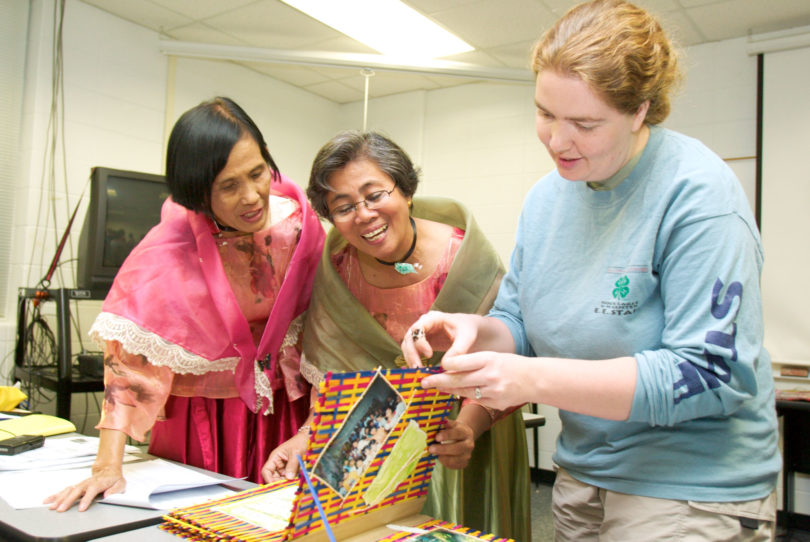The science education department has received a two-year Fulbright Educational Partnership Grant to work with teacher educators, science teachers, student teachers and community members halfway around the world in the Philippines.
The partnership expands the work of Deborah Tippins, professor of science and elementary education at UGA, whose research into community-based science education over the past few years had led her to the Philippine island of Panay. Tippins began collaborating with science teacher educators at West Visayas State University (in Iloilo), as well as with classroom teachers and student teachers in rural barangay (community) elementary schools. Tippins had spent the 2001-02 academic year in residence at WVSU as a Fulbright Scholar.
The new Fulbright partnership, an initiative of the U.S. Department of State’s Bureau of Educational and Cultural Affairs, supports a three-way collaboration involving UGA’s science education department, the Regional Science Teaching Center and College of Education at WVSU, and the Regional Science Teaching Center of Western Mindanao State University (in Zamboanga).
The first of several planned exchanges began in February, when a small group of science education faculty from UGA spent several days living, learning and teaching in a variety of rural, coastal and mountain communities in the southern Philippines. They made presentations on science teaching strategies and qualitative research methodologies to the Filipino teachers and teacher educators.
In recent years, however, educators in Southeast Asia have emphasized using local knowledge and resources in the barangays to develop relevant science curriculum, and so these researchers are trying to develop science education based on local needs, including environmental and health issues. Consequently, the UGA faculty participated in field experiences designed to enrich their understanding of coral reef and mangrove ecology in the Philippines.
The rapid economic and cultural change taking place in the Philippines give teachers many environmental and health dilemmas, says Tippins.
“For instance, in the elementary schools with which we work, science educators are teaching children about the problems of deforestation and how that relates to the ozone layer,” she says. “Yet, after school, children go home and accompany their parents on the farms to cut down trees. These trees are burned to make charcoal, which is then sold to buy food for the next day. So there’s an issue of short-term versus long-term benefits. This issue is a challenge for the science teacher, as it creates tension between home and school values.”
One outcome of Tippins’s earlier collaboration in the Philippines was the development of the Casay Environmental Education and Indigenous Studies Center in Anini-y. The center serves as a hub for professional development of science teachers, and gives science education faculty and students, K-12 classroom teachers and students, and community members a chance to explore together pressing community environmental issues-deforestation and erosion, water quality, dynamite blasting of coral reefs, waste disposal.
“Faculty exchange visits are an important aspect of the partnership,” says Tippins. “Over the next two years, nine faculty members from the UGA science education department will visit WVSU and eight Filipino science teacher educators will visit UGA.”
The first group of Filipino faculty visited UGA earlier this month. They spent a great deal of time in discussions on campus, but their itinerary also included the Stone Mountain Environmental Interpretive Center, the Chattahoochee Environmental Center, Sea World and Zoo Atlanta. They also observed science classrooms at Barrow Elementary (Clarke County), Russell Middle School (Barrow County) and Madison County High School. The visits will give faculty the opportunity to examine, compare and document models of science teacher preparation, share ideas through collaborative research and practice, and strengthen cross-cultural understanding of issues of diversity that affect the preparation of science teachers.
“Both WVSU and WMSU are located in provinces on separate islands far from the resources of metro Manila,” says Tippins. “Both are located in seaport cities, surrounded by rural rice, mango and coconut farms. WVSU has a rich tradition of preparing public school teachers and its College of Education is designated as a Center of Excellence. As the oldest educational institution in the region, WMSU is strategically located where the Visayan and Muslim cultures meet. Education is carried out amidst a variety of beliefs and tradition.”








